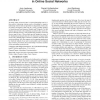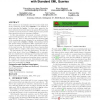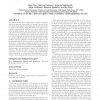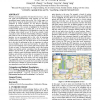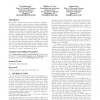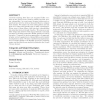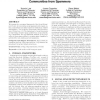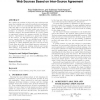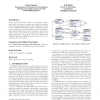114
Voted
WWW
2010
ACM
15 years 9 months ago
2010
ACM
We study online social networks in which relationships can be either positive (indicating relations such as friendship) or negative (indicating relations such as opposition or ant...
125
Voted
WWW
2010
ACM
15 years 9 months ago
2010
ACM
Web crawlers are increasingly used for focused tasks such as the extraction of data from Wikipedia or the analysis of social networks like last.fm. In these cases, pages are far m...
120
Voted
WWW
2010
ACM
15 years 9 months ago
2010
ACM
We explore the use of the landing page content in sponsored search ad selection. Specifically, we compare the use of the ad’s intrinsic content to augmenting the ad with the wh...
125
click to vote
WWW
2010
ACM
15 years 9 months ago
2010
ACM
With the increasing popularity of location-based services, such as tour guide and location-based social network, we now have accumulated many location data on the Web. In this pap...
133
Voted
WWW
2010
ACM
15 years 9 months ago
2010
ACM
We present Content Extraction via Tag Ratios (CETR) – a method to extract content text from diverse webpages by using the HTML document’s tag ratios. We describe how to comput...
101
Voted
WWW
2010
ACM
15 years 9 months ago
2010
ACM
Cross-site scripting flaws have now surpassed buffer overflows as the world’s most common publicly-reported security vulnerability. In recent years, browser vendors and resea...
108
Voted
WWW
2010
ACM
15 years 9 months ago
2010
ACM
We present the conceptual framework of the Social Honeypot Project for uncovering social spammers who target online communities and initial empirical results from Twitter and MySp...
120
Voted
WWW
2010
ACM
15 years 9 months ago
2010
ACM
We consider the problem of deep web source selection and argue that existing source selection methods are inadequate as they are based on local similarity assessment. Specificall...
93
Voted
WWW
2010
ACM
15 years 9 months ago
2010
ACM
Service descriptions allow designers to document, understand, and use services, creating new useful and complex services with aggregated business value. Unlike RPC-based services,...
107
Voted
WWW
2010
ACM
15 years 9 months ago
2010
ACM
Clustering and retrieval of web pages dominantly relies on analyzing either the content of individual web pages or the link structure between them. Some literature also suggests t...
